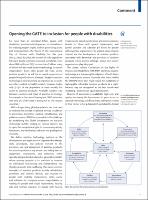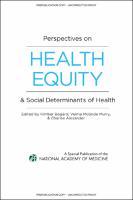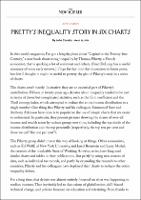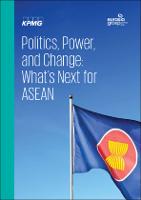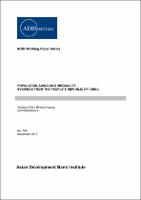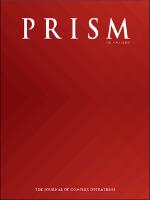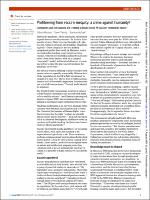Browsing by Title
Now showing items 195-214 of 299
-
One Health Surveillance Highlights Circulation of Viruses with Zoonotic Potential in Bats, Pigs, and Humans in Viet Nam.
(2023-03-20)
A One Health cross-sectoral surveillance approach was implemented to screen biological samples from bats, pigs, and humans at high-risk interfaces for zoonotic viral spillover for five viral families with zoonotic potential in Viet Nam. Over 1600 animal and human samples from bat guano harvesting sites, natural bat roosts, and pig farming operations were tested for coronaviruses (CoVs), paramyxoviruses, influenza viruses, filoviruses and flaviviruses using consensus PCR assays. Human samples were also tested using immunoassays to detect antibodies ... -
Online qualitative research with vulnerable populations in the Philippines: Ethical and methodological challenges during COVID-19
(2023-10-06)
Our article draws on two multi-sited studies to present the ethical and methodological challenges of conducting online qualitative research among vulnerable populations in the Philippines—specifically, among people who use drugs—during the COVID-19 pandemic. While the global scholarship has long articulated the difficulties inherent to pursuing research on such populations, we show how the specific milieu of the Philippines in the last three years has created exceptional, structural challenges to the conduct of said research. Besides the inevitable ... -
Opening the GATE to inclusion for people with disabilities
(The Lancet, 2015) -
Out-Of-Pocket Expenditure Associated with Physical Inactivity, Excessive Weight, and Obesity in China: Quantile Regression Approach
(2022-03-04)
Introduction: Previous studies exploring associations of physical inactivity, obesity, and out-of-pocket expenditure (OOPE) mainly used traditional linear regression, and little is known about the effect of both physical inactivity and obesity on OOPE across the percentile distribution. This study aims to assess the effects of physical inactivity and obesity on OOPE in China using a quantile regression approach. Methods: Study participants included 10,687 respondents aged 45 years and older from the recent wave of the China Health and Retirement ... -
Paths towards Universal Health Coverage: beyond political commitments
(2021-11)
The rapid economic growth in low and middle-income countries provides the opportunity of translating political commitment into action for achieving Universal Health Coverage. However, this is not straightforward. High donor dependence in low income countries; the lack of fiscal space; the inadequacy of attention to primary health care and under-developed pre-payment systems all pose challenges. Windows of political opportunity open up and ensuring that Universal Health Coverage makes it into the agenda of parties and subsequent holding them ... -
Patterns and correlates of physical activity and sedentary behavior among Bangkok residents: A cross-sectional study
(2023-10-04)
Background: Physical inactivity and sedentary behavior are significant risk factors for various non-communicable diseases. Bangkok, Thailand’s capital, is one of the fastest-growing metropolitans in Southeast Asia. Few studies have investigated the epidemiology of physical activity and sedentary behavior among Bangkok residents. This study aims to investigate the prevalence of combined physical activity and sedentary behavior patterns among Bangkok residents and examine relationships between participants’ characteristics and the combined ... -
Perceived barriers in accessing sexual and reproductive health services for youth in Lao People's Democratic Republic
(2019-10-29)
Background: Sexual activity during youth is common in Lao PDR. However, young people seldom utilize sexual and reproductive health services and subsequently suffer from poor sexual and reproductive health. The aim of this qualitative study was to explore the barriers perceived by youth that prevent their access to sexual and reproductive health services. Methods: Twenty-nine semi-structured interviews were conducted with 22 participants aged 15–25 years, from urban and rural areas. A vignette was used during interviews with those who had ... -
Perceived Barriers of Accessing Healthcare among Migrant Workers in Thailand during the Coronavirus Disease 2019 (COVID-19) Pandemic: A Qualitative Study
(2023-05-10)
The outbreak of Coronavirus Disease 2019 (COVID-19) has threatened health and well-being in all populations. This impact is also deepening structural inequalities for migrant workers in Thailand. Due to their vulnerability and limited opportunity to access health services, they have greater risks in many health aspects compared to other populations. This qualitative study sought to examine the key health concerns and barriers during the COVID-19 pandemic on healthcare access among migrant workers in Thailand through the lens of policymakers, ... -
Perceptions and management of postpartum haemorrhage among remote communities in Lao PDR
(2020-01-10)
Introduction: In Lao People’s Democratic Republic, despite a policy to provide free maternal health services in healthcare facilities, many rural women continue to deliver at home, without a skilled birth attendant. These women are at high risk of postpartum haemorrhage, the leading cause of maternal mortality in the country. While women in remote areas continue to be unable to access facility-based birthing, interventions to reduce postpartum haemorrhage are a priority. This requires an understanding of how women and their families recognise ... -
Perspectives on health equity and social determinants of health
(National Academy Of Medicine, 2017)
Social factors, signals, and biases shape the health of our nation. Racism and poverty manifest in unequal social, environmental, and economic conditions, resulting in deep-rooted health disparities that carry over from generation to generation. In Perspectives on Health Equity and Social Determinants of Health, authors call for collective action across sectors to reverse the debilitating and often lethal consequences of health inequity. This edited volume of discussion papers provides recommendations to advance the agenda to promote health ... -
Piketty’s Inequality Story in Six Charts
(The New Yorker, 2014) -
Political economy of Thailand's tax-financed universal coverage scheme
(2019-08-13)
Problem: The challenge of implementing contributory health insurance among populations in the informal sector was a barrier to achieving universal health coverage (UHC) in Thailand. Approach: UHC was a political manifesto of the 2001 election campaign. A contributory system was not a feasible option to honour the political commitment. Given Thailand’s fiscal capacity and the moderate amount of additional resources required, the government legislated to use general taxation as the sole source of financing for the universal coverage ... -
The Political Economy of UHC Reform in Thailand: Lessons for Low- and Middle-Income Countries
(2019-08-13)
Thailand achieved full population coverage of financial protection for health care in 2002 with successful implementation of the Universal Coverage Scheme (UCS). The three public health insurance schemes covered 98.5% of the population by 2015. Current evidence shows a high level of service coverage and financial risk protection and low level of unmet healthcare need, but the path toward UHC was not straightforward. Applying the Political Economy of UHC Reform Framework and the concept of path dependency, this study reviews how these factors ... -
The Politics of Drug Rehabilitation in the Philippines
(2022-06)
The international consensus to end compulsory drug treatments and close forced rehabilitation facilities needs urgent transformation to country policies. In the Philippines, as with other countries in Asia, rehabilitation can be compulsory and is seen as the humane alternative to the “war on drugs.” In this paper, we present the landscape of rehabilitation and narrate the ways in which people who use drugs are forced to undergo treatment. We unpack the politics behind rehabilitation and explain the sociocultural foundations that support compulsory ... -
Politics, Power, and Change
(KPMG)
There are 10 varied and challenging national storylines unfolding in ASEAN – and businesses need to join these conversations. Juggling the many demands of an increasingly complex stakeholder universe – from consumers to politicians, regulators to society at large – will require an understanding of the wide array of domestic and regional political risks in ASEAN. While there are some challenges that are common to many countries in ASEAN, the level of risk and trend direction vary. There are several questions on geo-strategy in the region: Will ... -
Population Aging and Inequality: Evidence from the People’s Republic of China
Population aging has significant economic and social costs, and this paper studies its impacts on inequality, both theoretically and empirically. First, we build a two-period overlapping-generation model with an uncertain lifetime and find that population aging has the overall effect of increasing income and consumption inequality within the society. For the empirical analysis, we use household data from the China Health and Nutrition Survey to assess the age effect on income and consumption inequality in the People’s Republic of China and confirm ... -
Post-COVID-19 health-care utilization: one year after the 2020 first wave in Brunei Darussalam
(2023-01-18)
Objective: Patients who recover from coronavirus disease (COVID-19) infection are at risk of long-term health disorders and may require prolonged health care. This retrospective observational study assesses the number of health-care visits before and after COVID-19 infection in Brunei Darussalam. Methods: COVID-19 cases from the first wave with 12 months of follow-up were included. Health-care utilization was defined as health-care visits for consultations or investigations. Post-COVID condition was defined using the World Health ... -
Prevalence and socio-demographic determinants of depression among inmates of a prison in Malaysia
(2019-07-30)
Depression is the most common form of mental disorder among prison inmates. The objective of this study is to determine the prevalence and socio-demographic determinants of depression among adult male inmates in a local prison in Malaysia. This cross-sectional study was conducted among 460 inmates who were systematically selected. Depression was screened using the Center for Epidemiologic Studies Depression (CES-D) scale. Chi-square tests and multiple logistic regression were applied to determine the association between depression and associated ... -
PRISM
(the Institute for National Strategic Studies at the National Defense University, 2021)
The global COVID-19 pandemic of 2020-2021 has catalyzed a re-examination of what national security consists of, and what responsibilities the world’s armed forces must or should assume to meet such non-military challenges. Yet the competition between the United States and its adversaries has intensified, requiring that the national security enterprise retain traditional capabilities while keeping up with the fierce pace of technological innovation. PRISM V.9,N.2 authors address the emerging challenges armed forces must meet, offer perspectives ... -
Profiteering from vaccine inequity: a crime against humanity?
(BMJ, 2021-08-16)



